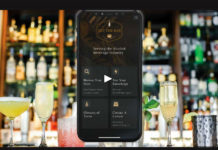Writers through the years have called it “the Mount Rushmore of bars,” “the house that hooch built,” “Disneyland for serious drinkers,” “the most famous bar in the whole world,” and “the answer to posterity and the future of Western civilization.” One flamboyant journalist even tagged it “the crossroads of the world” and claimed it “doles out demon rum on a scale unmatched by any other saloon in the world.” A survey reported that 95 percent of all first-time tourists to New Orleans go there.
Pat O’Brien’s opened its doors on Dec. 3, 1933, jumping the gun on the repeal of Prohibition two days later — a move so New Orleans that nobody even blinked. O’Brien’s smallish establishment – then located a block away in the 600 block of St. Peter Street, where Johnny Donnels’ photography studio is today — was already a speakeasy with the password “Storm’s brewin’.”
So the conversion to legal drinking establishment was a technicality. “That’s what they say,” said Shelly Oechsner Waguespack, a vice president of the city’s legendary watering hole, which will celebrate its 75th anniversary Wednesday with a block party beginning at 7:30 p.m. The Bucktown All-Stars will perform and Santa Claus is scheduled to appear.
“It’s amazing the passion people have for this place, such emotion — it’s just overwhelming,” Waguespack said. “The engagements, the birthdays and anniversaries, the celebrations, the celebrities, things that went on here . . .”
No doubt. As she was speaking, a customer walked by saying to a friend, “Remember that time we came here in a limo and you . . .”
Among the pages on Pat O’Brien’s Web site is one titled, “If only the fountain could talk.” That would be the flaming fountain in the famous, spacious courtyard off the carriageway entrance, where, one night, fitness guru Richard Simmons and his entourage jumped up on the wrought iron chairs and held an exercise session.
That’s why the waiters will tell you, “Anything can happen in here.” O’Brien was a bootlegger in Louisiana and Mississippi who, so the story goes, passed through New Orleans, got stuck here and opened a small package liquor store/speakeasy. He was a retail dealer and his eventual partner, Charlie Cantrell, was a wholesaler. They had met on Louisiana’s Bootleg Highway during Prohibition.
“Nobody paid much attention to bootleggers around here,” Cantrell once told me. “There were just a handful of agents. New Orleans was never rough like Chicago or New York. There was no hijacking and we had an excellent police force — so no outsiders got in. The local people respected each other.
Everybody was making a living so it wasn’t worth killing people for.” O’Brien had moved from the downtown side of St. Peter to 638 St. Peter and by 1936 was looking for a partner. Enter Cantrell.
A few years later they bought the building at 718 St. Peter, the current location, which now, thanks to a more recent purchase, has an entrance on and access to Bourbon Street. Built in 1791, it was once the home of the first French theater company in New Orleans. If only the curtain could talk. In the mid-1940s, Pat O’Brien created the Hurricane drink and the bar’s business really took off. At the time, there was a shortage of bourbon and scotch, and the whiskey companies sent “missionary men” out with regular salesmen and coerced bar owners into buying large quantities of a not-so-popular, hard-tounload booze — rum — in outrageous amounts, 50 cases or so, in order to get the bourbon and scotch they wanted.
Four ounces of the booze nobody wanted, through trial and error, made its way into a glass shaped like ahurricane lamp with fresh lemon juice, passion fruit syrup and crushed ice — and became the most famous drink in the most famous bar in the city. Eventually the Cyclone, Squall, Breeze and Typhoon would become part of the drink menu, but the big boy will always be the Hurricane.
“No matter who told the stories, they all had different versions of what happened,” Waguespack said. “But that’s pretty much it.”
Cantrell, who had also been a bartender, blackjack dealer and professional gambler before his bootlegging days, was never bothered that his name was not closely associated with the bar’s fame. He always joked that it was a good thing O’Brien was nicknamed Pat. “Can you imagine anyone coming to Benson Harrison O’Brien’s bar?” he liked to say, invoking O’Brien’s real name. Waguespack’s father is current owner Sonny Oechsner. His dad, George Oeschner Jr., bought Pat
O’Brien’s in 1978 and Sonny took it to new heights with locations in Cancun, Mexico; Orlando, Fla.; San Antonio; and the just-opened Destin, Fla., bar.
“It’s just been a wonderful experience,” he said. “The dedication of the employees, they just stick with you. There’s no telling how many years of longevity we have here.” Indeed. The bar has a 25-year club, and there are 15 or so employees who are well past that milestone, for which they were rewarded with a Caribbean cruise. “It’s like family here,” Waguespack said.
The concept of the piano bar, then the dueling pianos, was key. Customers sit in green cushioned chairs around copper-topped tables in front of a stage with two matching copper-topped baby grand pianos. O’Brien and Cantrell were distraught in 1967 when popular pianist Emile Parra died. But others quickly picked up the slack. Old-timers will recall names such as Mercedes LeCorgne, Connie Kaye and Barbara Bennett, who once sang with Jerry Lee Lewis.
Today, there is a whole stable of pianists continuing the tradition of playing college fight songs and other requests written on napkins. Among the performers with the most longevity include Alvin Babineaux, Henrietta Alves, Vickie Amato and Jan Reeks.
But the longest-running act, without a doubt, was Eddie Gabriel, Pat O’s “Rhythm King,” whose life was taken by Hurricane Katrina’s floodwaters at age 95. An employee since 1938, Gabriel’s gig began in 1942 when the waiter was paid in loose change, which wound up on his metal tray. Gabriel tapped the bottom of the tray, liked the sound of it and told the piano players. The next night the waiter got onstage and tapped his tray to a bunch of songs. His fingernails broke, so he bought some thimbles, put them on and was tapping at the bar nightly until his death. Always decked out in a suit and his trademark sunglasses (even at night), Gabriel wouldn’t consider retirement and never missed a day of work, citing other waiters who had retired and were pushing up daisies. He delighted in the crowd yelling, “Eddie! Eddie! Eddie!”
There have been no shortage of celebrities who have passed through the portal on St. Peter Street, including coaches and players of Sugar Bowl and Super Bowl teams. Sean Connery, back when he was riding high as James Bond, made a stop there in 1967. So did actors Michael Caine, Richard Burton and Elizabeth Taylor, and singers Billy Joel, Willie Nelson and Carol Channing. Former Speaker of the House Tip O’Neill not only stopped in but wrote a letter thanking Pat O’s staffers for their hospitality.
And don’t forget the bar’s namesake, actor Pat O’Brien, who played a lot of cops and priests in movies with Jimmy Cagney. Pat O’Brien’s was the longtime hangout of local TV and radio sportscaster and personality Wayne Mack, who brought the Chicago Bears’ Dick Butkus along with him on a couple of occasions. The Manning clan has made a few stops there, as has Saints head coach Sean Payton and his would-be wide receiver, country music star Kenny Chesney.
But even though countless visitors pass through the doors each year, locals are still a major part of the scene. The main bar, to the left as one enters the carriageway entrance, has the feel of a neighborhood bar, with a television showing sporting events, a jukebox, photos of loyal customers on the walls, mirrors and beer steins hanging from the ceiling. Regulars will no doubt recall the seaman-turned-bon vivant world traveler, Red Mouton, who held court there for years. Or Quarter character Ruthie the Duck Girl, a fixture. Pat O’s even sponsored the “Ruthie the Duck Girl” documentary premiere at the Contemporary Arts Center.
“It is very difficult to wrap your arms around everything that is Pat O’Brien’s,” Waguespack said. “The celebrities, the so-called important people, are wonderful, but everybody’s a VIP here — that’s our motto. Locals are the heart and soul of what we are all about — passion for fun and life.”
Columnist Angus Lind wrote this article for the Times Picayune.








